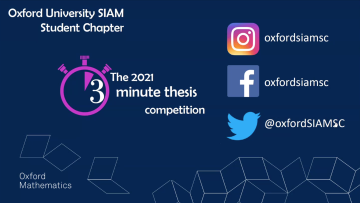North Meets South
Abstract
Clemens Koppensteiner
Categorifying Heisenberg algebras
Categorification replaces set-theoretic structures with category-theoretic analogues. We discuss what this means and why it is useful. We then discuss recent work on categorifying Heisenberg algebras and their Fock space representations. In particular this gives a satisfying answer to an observation about equivariant K-theory made by Ian Grojnowski in 1996.
Aggregation-Diffusion Equations
David Gómez-Castro
The aim of this talk is to discuss an evolution problem modelling particles systems exhibiting aggregation and diffusion phenomena, and we will focus mostly on the so-called Aggregation-Diffusion Equation: ∂ρ ∂t = ∇ · (ρ ∇(U′ (ρ) + V + W ∗ ρ)) (ADE)
First, we will discuss the modelling. The famous case U′ (ρ) = log ρ and W = 0 is the famous Heat Equation. In the classical literature, the term U′(ρ) is typically deduced from Darcy’s law and models an internal energy of the system. We will show through particle systems how the term V models a confinement energy and W ∗ ρ an aggregation energy. The complete model covers many famous examples from different disciplines: Porous Media, Fokker-Plank, Keller-Segel and others. After this modelling, we discuss the mathematical treatment of (ADE). As in the case of the Heat Equation, the diffusion cases where W = V = 0 are typically studied in the Lebesgue and Sobolev spaces. However, as in the Keller-Segel problem, a Dirac measures may appear in finite time. We present the Wasserstein distance between measures, which is a natural framework for these equations, connecting with the theory of Optimal Transport. In fact, when U, V and W are convex, (ADE) can be studied as the gradient-flow of a free-energy functional (i.e. curves minimising this energy) in this Wasserstein distance, applying Calculus of Variations techniques. We will discuss the minimisation problem associated to F, with an interest to the existence of Dirac measures. Finally, we will present new results showing that indeed, in some cases besides Keller-Segel, states with a Delta can be achieved through solutions of the evolution problem



